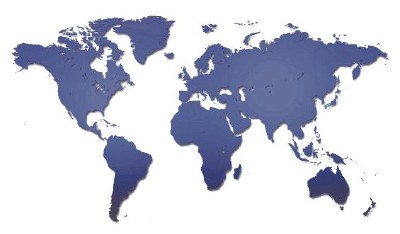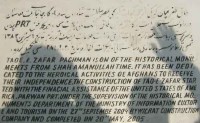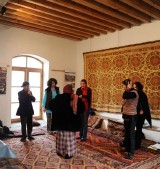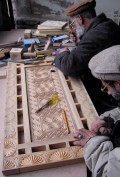International support
International support

The format of the Afghanistan Cultural Profile diverges from the other national profiles hosted by Visiting Arts in that it lists ‘International Support’ separately from ‘Afghan Cultural Policy and Infrastructure’. This differentiation acknowledges the influence of international development aid in the cultural sector, which is quite different from countries that do not find themselves at the centre of nation-building such as that under way in Afghanistan since 2002.
 There is much nostalgia among Afghans who remember how in the 1970s traditional arts and crafts were an integral part of the lives of the population, and when Kabul was host to a lively and diverse cultural scene spanning traditional and western art forms. This memory, however, is fading fast among a population whose median age is estimated to be 18 years and whose average life expectancy is considered to be 44, while much of the educated elite continues to live outside of the country. In fact, the line between ‘Afghan’ and ‘foreign’ has become blurred with a generation of Afghans who have built new lives for themselves and their children abroad, and who are often torn between nostalgia for the pre-war traditions of their original homeland and the desire to introduce modern elements of their new lives to a ‘backward’ society.
There is much nostalgia among Afghans who remember how in the 1970s traditional arts and crafts were an integral part of the lives of the population, and when Kabul was host to a lively and diverse cultural scene spanning traditional and western art forms. This memory, however, is fading fast among a population whose median age is estimated to be 18 years and whose average life expectancy is considered to be 44, while much of the educated elite continues to live outside of the country. In fact, the line between ‘Afghan’ and ‘foreign’ has become blurred with a generation of Afghans who have built new lives for themselves and their children abroad, and who are often torn between nostalgia for the pre-war traditions of their original homeland and the desire to introduce modern elements of their new lives to a ‘backward’ society. While the provision of international aid since 2002 has resulted in a degree of diversity in the cultural realm, the dynamic is widely acknowledged to be different from that which prevailed in the 1970s. Afghan cultural organisations or professionals often now receive external support in the context of development aid, which is generally tied to the wider goals of nation-building and increasingly perceived as political.
While the provision of international aid since 2002 has resulted in a degree of diversity in the cultural realm, the dynamic is widely acknowledged to be different from that which prevailed in the 1970s. Afghan cultural organisations or professionals often now receive external support in the context of development aid, which is generally tied to the wider goals of nation-building and increasingly perceived as political.UNESCO’s policies and activities in Afghanistan are presented in the UNESCO Country Programming Document Afghanistan 2010-11 and aligned with the Afghanistan National Development Strategy (ANDS) for 2007/8-2012/3. National governments tend to support the cultural sector through cultural missions and through donor funding managed by their diplomatic missions.
Non-governmental organisations also play an important part in the cultural realm. The Afghan NGO law defines ‘foreign’ NGOs, usually termed ‘international’ by the foreigners involved, as having been established outside of Afghanistan according to the law of a foreign government and accepting the terms of the Afghan NGO law.
 International support has been playing an important role in the cultural sector in Afghanistan. However, no amount of external assistance can reinstate the culture of a society whose memories and traditions have been disrupted for more than a generation through the trauma of violent conflict, displacement and ongoing insecurity. What may have been achieved, with varying degrees of success, is to pick up some of the pieces and to give Afghans some space in which to reinvent themselves in a changed world order.
International support has been playing an important role in the cultural sector in Afghanistan. However, no amount of external assistance can reinstate the culture of a society whose memories and traditions have been disrupted for more than a generation through the trauma of violent conflict, displacement and ongoing insecurity. What may have been achieved, with varying degrees of success, is to pick up some of the pieces and to give Afghans some space in which to reinvent themselves in a changed world order.Use the navigation bar on the right to make direct contact with organisations and individuals providing international support for Afghanistan's cultural sector.
